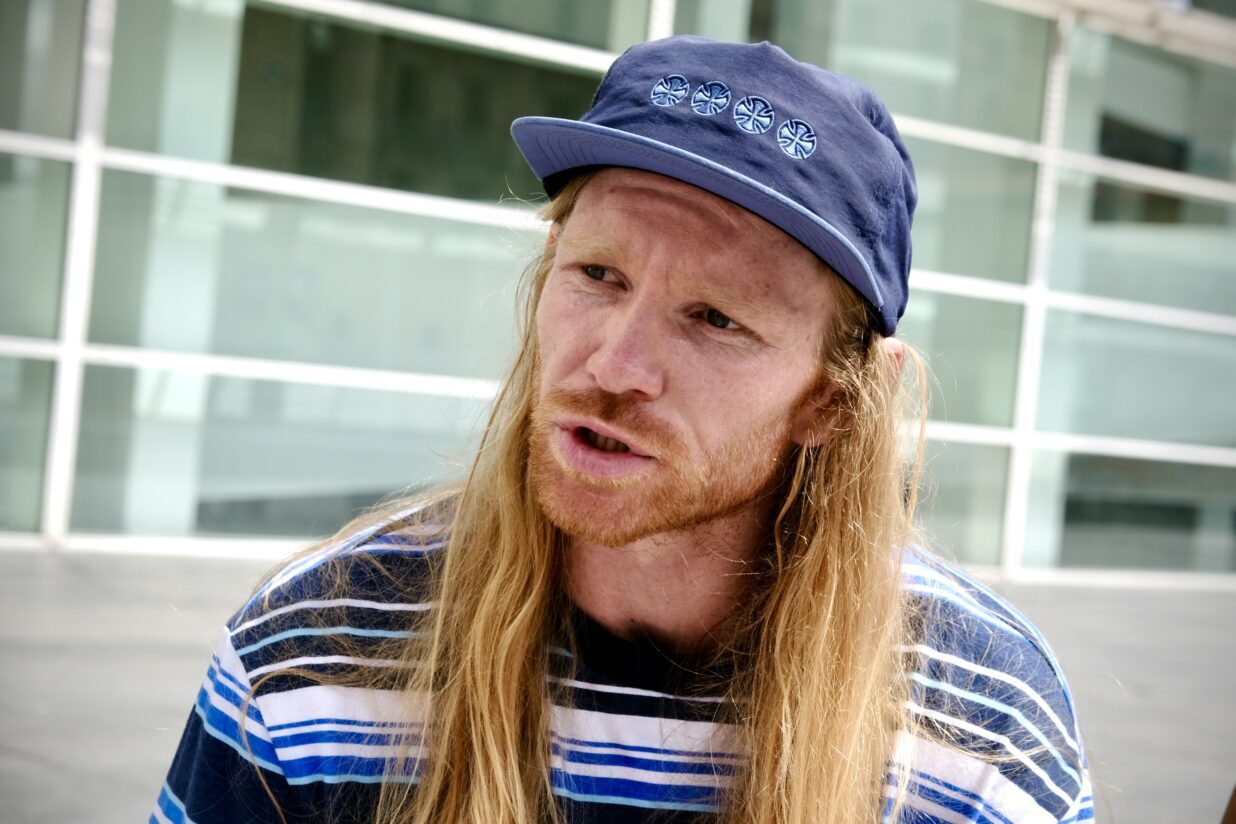03.07.2022 - 11:27
|
Actualització: 03.07.2022 - 11:48
William Aitken, a 32-year-old Scotsman who took part in protests in Barcelona city following the imprisonment of rapper Pablo Hasél, has been sentenced to five years and two months in prison. He is still trying to come to grips with the enormity of a punishment which he claims bears no relation to the crime he was accused of. According to Aitken, “five years in jail is the sort of prison sentence actual criminals get”.
We interviewed him outside Barcelona’s MACBA, where he usually hangs out with his skater friends. He’d arranged to meet them to announce his sentence. They have decided to create a support group with the legal assistance of Alerta Solidària in order to fight through the remaining legal process. It could be up to two years before the ruling becomes final.
—How are you feeling?
—Emotionally, my feelings are changing all the time, from incredibly happy to incredibly sad and negative. It depends on the situation, the context, whether I’m alone, with friends, with my girlfriend… I feel this pressure inside me that I’ve never experienced before. It’s a horrible feeling, to see the length of the sentence next to my name. Five years and two months.
—How did you hear the news?
—I got a call from the court and they told me that the ruling had come through and that I could go and pick it up. They didn’t let my girlfriend into the building, so I went in by myself. A member of staff gave me the papers stating that I’d been sentenced to one year and three months and three years and nine months for the crimes of public disorder and assault on authority. As I read the sentence, this weird hot and cold feeling came over me, I felt dizzy, and I was in a state of shock. It was like a nightmare in which I was losing the life I’d lived up until then. I couldn’t believe it. I went outside and told Fernanda, and then called my lawyer, David. It was a really tough day.
—Why do you think the ruling is unfair?
—I’ve received a very long, very harsh sentence; any other more serious crime would have recieved a lower penalty. One year and three months simply for public disorder. They say I broke up stones with my skateboard, but a skateboard is much more likely to break before a pavement does. It’s impossible. And the skateboard they showed at the trial was in good nick, with no marks, except for a few scuffs, which you’d expect. Besides, it was new, and I would have never used it to hammer the pavement with.
—And the sentence of assault on authority?
—They say I threw stones at the police vans, but they have no proof. No police officers were injured, either. It’s ridiculous. They also say I moved rubbish skips, but it’s hard to do for someone holding a skateboard who only has one free hand. All in all, the charges are baseless and don’t make any sense.
—What were you doing at the demonstration?
—That afternoon I’d met up with my friends to go skating in El Prat de Llobregat. We took the metro back to Passeig de Gràcia station in Barcelona and when we came out we were in the middle of the demonstration. I’d never been to a demo like it. I’d been to demos during the day which were calmer, but I’d never seen that before. Which is why I stayed. I took pictures and sent them to my friends back in Scotland and other friends to show them what was going on, to show them how people were protesting for the freedom of expression and to defend their rights.
—The judge rejected the prosecution’s request to cut down your sentence by two-thirds in exchange for being deported from Spain. Would you have preferred for them to have agreed to it?
—No, not at all. I moved to Catalonia six years ago. Returning to Scotland isn’t an option. I want to stay here to fight for my freedom, for the life I’ve created with my partner, my brother, and my friends. Deportation isn’t an option. I’m here to live and fight for a good outcome to my case.
—Are you afraid you’ll end up in prison?
—Yes, I am, because I realise how easy it was to hold me on remand after I was arrested that evening. I know they have the strength and the power, but I feel confident that I won’t wind up in jail.
—What are you planning on doing next?
—First of all, we’ll analyse how they’ve interpreted the law to say that I’ve committed these crimes, to be able to make a good appeal. We’ll now appeal against it at the High Court of Justice of Catalonia, but there are still hoops to jump through. And, above all, to publicise the case in the media, on social media, to talk to whoever it takes in Catalonia and Scotland.
—Does this sentence set a precedent for other protesters?
—I think they’ve sought to make an example of me to show young people that it’s better not to protest, in order to scare them. They want to keep them on a short leash. It’s totally unjustifiable to sentence someone to five years in prison for going to a demo and voicing their opinion. It’s the sort of sentence actual criminals get, not people who make use of the freedom of expression. It only makes sense as a means to silence people, but it’ll only help the movement to grow.


